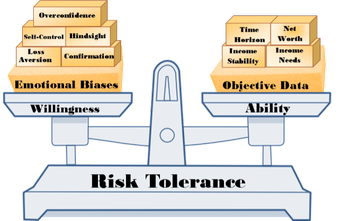
When it comes to the weather in Arizona, we’re almost on the same weather schedule as the southern hemisphere. Sure, our warm period is the same as the rest of the country (using “warm” liberally here) but in reality, we’re all kind of waiting around for fall and winter. So, the whole “summer is ending” feeling hasn’t really been much of a thought to me. Not even in the traditional summer break sense, since our first day of school growing up was in mid-July. But everywhere else in the US, there seems to be a regrettable feeling when it comes to the end of summer. No more swimming, barbecues, yard games (again, for the rest of the country. October to February is our Prime time. In Arizona we have a similar dread after the thermometer crosses 90 in April or May.) And even if you like what may come with the changing seasons, most people are probably going to yearn for those warm summer days to come again.
You’ve probably noticed the market and economy has had a pretty good 12-year run. It’s been a LONG summer, with seemingly no real losers since then. We’ve seen record low unemployment and record gains for stocks. But recently, a few “leaves” have started to fall off the trees. Rate cuts may have been followed by a rise in the markets, but the cuts are actually a symptom of a future economic decline. The yield curve inverted, showing the market may be at the end of this run. The Trade War is more like a Trade Cold War (at the moment), but we don’t really know what may come from these proposed-and-later-rescinded threats of tariffs. We’ll soon be in election season yet again, bringing extra future uncertainty. So, while we don’t really have the means to make a prediction to when the market’s “summer” will end, we do know that it eventually has to end. Market and economic runs have always ended at one point.

Since we know the market will soon be in “winter,” what should you do to ensure you make it through winter okay? Well first thing, you should evaluate what “buckets” of assets you have and what you need to use them for. Do you have necessary emergency funds just in case the record unemployment numbers increase? If you don’t have a need for a short-term bucket, then your ability to take risk is probably higher and you should be able to sit tight through winter. Each percentage of loss requires much higher gains to make up from those losses. For those not using SEM’s “bucket” method, make sure you’re evaluating your needs. A simple buy-and-hold strategy won’t work if you don’t have the time to make up those losses.
Part of the winter also includes a need to change in your spending habits. Borrowing hit an all-time high during this bull market, and it will certainly be harder to borrow as the market continues to slow down. This would be a good time to not just evaluate emergency funds in your short-term buckets, but also to look at your cash flow situation.
- Are you spending a high amount of your income?
- Are you taking on more debt than you should be?
- Do you have a budget with plenty of room for flexibility should your income be cut?
You may also want to make sure your resume is updated. While we hope nobody loses their job, we do know after 11 years of job gains there is a high likelihood of some mass layoffs coming down the road during a recession. Being prepared and having proper expectations of what you’re able to do during winter will certainly make living during winter easier.

Next, you should re-evaluate your risk tolerance. Are you really comfortable with losing 40% of your investments? For the past 12 years, I’m guessing most of the time people remember the gains with very few losses. And yes, those gains have surely been glorious, but in order to get those gains, you have to take on additional risks. This includes looking at your 401(k) or company retirement plan allocations. Too many times employees have far more exposure to the stock market than they should, especially in terms of how much they have invested in their own company’s stock. Remember, if your company is hurt during a recession you not only risk losing your source of income, but also your retirement savings. Make sure your portfolio is one where you won’t have to feel extra panic during winter.
It’d be nice if it was always summer in the market; however, we know from the entire history of the market that it works in cycles and there will be bad times. There will be recessions, but there is a positive to recessions — after recessions come spring and summer yet again. For every 2008 there is a 2009. The future market problems won’t last forever, even though it will seem like it while it’s happening. Our current market indicators remind us this is a great opportunity to really calibrate what your current plan is. You have an opportunity to get back on track before winter is here. But winter will get here, make sure you’re ready so you can have a great spring!
If you’d like a free financial assessment, head on over to WhatsMyScore.net to get started today.




